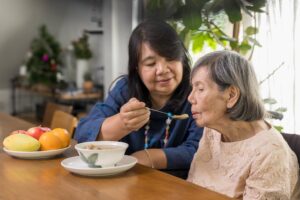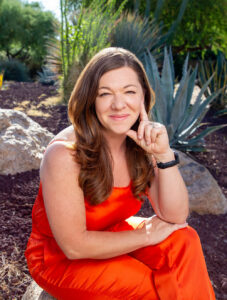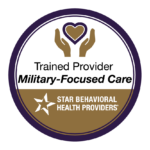I’m not sure what there are more of when it comes to first taking on the role of a caregiver for an aging or ill parent, feelings or questions. Like a lot of things in life, it doesn’t matter how meticulously you plan for it, you never realize how some things may affect you until you’re in the thick of it. If you’re new to the caregiving gig, read on to learn a few things that may be helpful as you learn your new role, feel these new feelings, and try desperately to just hold it together for five more minutes. You’ve got this. I promise.
Most of us who take on the role of caregiver are thrust into the role more quickly than we’re prepared to be. Whether your parent or loved one’s health declines rapidly or there is a slow progression, coming to the realization that they’re no longer able to live as independently as they once did is a tough one for everyone involved. Fortunately, there are tons of resources available for adult caregivers of loved ones. That’s not what this article is about though. If you’re reading this, chances are you’re already up to your ears with handouts, pamphlets, phone calls, and emails, chock full of phone numbers, websites, names, and organizations who are willing to help you with providing the best care possible to your loved one.
It’s knowing where to start or who to turn to that’s the hard part. It’s not becoming overwhelmed and remembering to care for yourself that seems impossible. It’s staying strong for your loved one while remaining vulnerable and realizing it’s OK to cry. And it’s allowing yourself the grace to feel upset, angry, sad, and happy all on the same day. We want to talk about all the feelings that are involved with becoming a caregiver for your parents or loved ones. We want to talk about you.
Caregiver Stress and Burnout
 A caregiver has many jobs, especially if you’re caring for your parents or loved ones. You’re not just responsible for the physical safety and well-being of the person who raised you, you’re responsible for their mental health, too. On top of that, even if they did most of the planning ahead of time, there is usually still a significant amount of legal and financial planning for which you’ll become responsible. You’ll quickly have to become familiar with terms like “power of attorney” and “advance directives” if you’re not already. It doesn’t end there, either. Even in the best of scenarios, you’ll be required to navigate the complex elder healthcare system and learn to speak the language of hospital social workers, case workers, Medicare, and health insurance.
A caregiver has many jobs, especially if you’re caring for your parents or loved ones. You’re not just responsible for the physical safety and well-being of the person who raised you, you’re responsible for their mental health, too. On top of that, even if they did most of the planning ahead of time, there is usually still a significant amount of legal and financial planning for which you’ll become responsible. You’ll quickly have to become familiar with terms like “power of attorney” and “advance directives” if you’re not already. It doesn’t end there, either. Even in the best of scenarios, you’ll be required to navigate the complex elder healthcare system and learn to speak the language of hospital social workers, case workers, Medicare, and health insurance.
This is all just the tip of the iceberg and doesn’t even include the fact that all the while, you’re worried about the fact that your mom or dad is sick. When faced with this amount of constant stress, mental, and emotional burden, and just plain work, our bodies quickly go into survival mode. Survival mode is that feeling when we can’t turn off. Even once we’ve managed to check everything off a to-do list, we still can’t relax or focus. We’re snapping at the kids. We can’t find enjoyment in the little things. Everything is just irritating. We’re exhausted no matter how much sleep we get. It’s all just too much and can lead to chronic stress and anxiety if left unchecked.
Loneliness and Hopelessness
Even though you may have plenty of resources and people to help with the ever-growing list of things to do, the final decision-making usually falls on you alone. Being responsible for those decisions, when you’re already in a heightened state of alert because you’re in survival mode, can leave you feeling incredibly lonely. Then, things just snowball from there. Every kid has that moment when they just want to call their mom or dad and ask what they should do. This doesn’t change when you’re an adult in the role of a caregiver for your parents. The only problem is it’s your mom or dad that you’re caring for, so you can’t do that. This only amplifies the feelings of loneliness and hopelessness that you felt before. Every caregiver feels these terrible feelings at some point. They suck. You are not alone and there is hope for normalcy.
Feeling Guilty
Another feeling that we’ve all experienced as caregivers of our parents or loved ones is guilt. Guilt comes in many forms for caregivers. You may feel resentful for the time you’ve lost at work or with your family. You may feel bad for just flat-out not wanting to do it anymore. There’s no question that there will be days when you’ll be so exhausted that you just want to stay in bed. Because you’ve been running in survival mode for so long, your body hurts and your brain is foggy, so you just feel like quitting. You wouldn’t, but because you thought about it, now you can add guilt to the list of bad feelings. This is normal. You’re not a bad person. You’re a human being.
It’s also normal to get frustrated with your loved one for not taking their meds, not eating, or whatever the case is that day. Again, you’re just a human being. You won’t get this caretaking thing down perfectly every time and that’s OK. Feeling guilty is a normal feeling, but it’s also an unhelpful feeling.
Accepting Help
Some people are made to be caregivers and some people aren’t. That’s OK, too. That’s why we have nurses, health aides, therapists, and friends. Not everyone can sing like Whitney Houston, much the same that not everyone can offer a nurturing hand like a trained and gifted caregiver. If you’re just starting your journey of caregiving for your parent or loved one, it’s important to understand that you’re all learning this together. Your parents have never been cared for by their kid, just as much as you’ve never cared for them. Parents never want to be a burden to their children. So, whether they realize it or not, a part of them may resist allowing you to help them. This is normal, too. Plus, you may not have the gift of caregiving immediately. Even if you feel obligated to do it all on your own, it’s OK to accept help from a trained caregiver, nurse, or friend if it’s available. Your parent or loved one may be more willing to open up to or accept help from someone else, despite all you do for them. Don’t let this hurt your feelings. Just take the help. It’s their way of helping you, even when they can’t.

Caregiver Support Therapy
Another way to help yourself is to talk to someone. All these feelings, stress, burnout, loneliness, hopelessness, guilt…they’re just skimming the surface of what it’s like to be an adult caregiver for your parent or loved one. At MUV Counseling, our Caregiver Support helps you focus on yourself and shift unhelpful feelings. We’ll help you to learn new coping skills and manage your emotions. Our goal is to give caregivers a safe place to speak and share their experiences, good and bad. We understand the sacrifice that caregivers make and we’re here to help you build acceptance and self-compassion. Reach out today for a free 15-minute consultation for caregiver support and therapy in Scottsdale.




